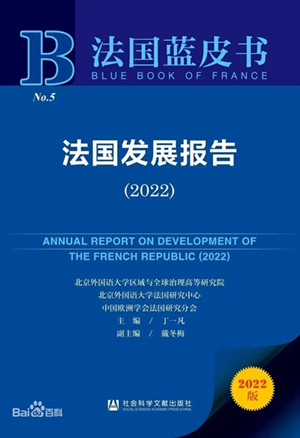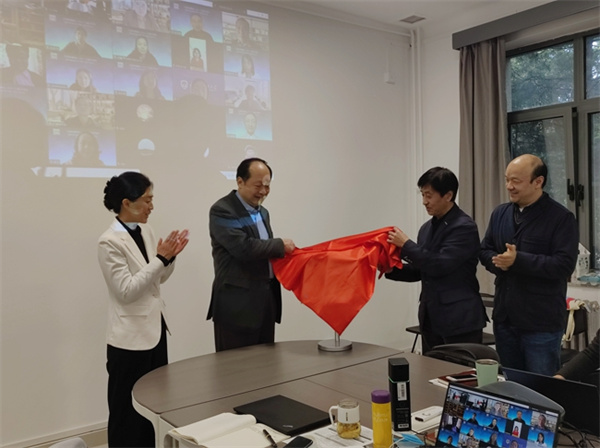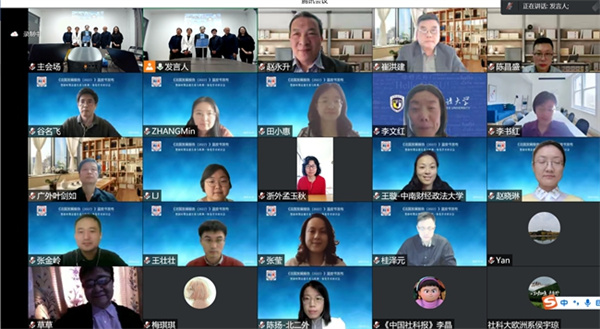- Research
- Research Centers
- Journals
- Admission
- Introduction
- Programs
- Application
- Alumni & Giving
- Alumni Club
- Giving
The Blue Book of France: Annual Report on Development of the French Republic (2022) was released at Beijing Foreign Studies University (BFSU) on Nov 12.
The book, jointly released by the Centre for French Studies registered with the Ministry of Education at the Faculty of French and Francophone Studies at BFSU, the Academy of Regional and Global Governance at the university, the French Studies Society at the Chinese Association for European Studies and the Social Sciences Academic Press (SSAP), is the fifth blue book of the French series.
The launch ceremony of the book was followed by a symposium on Franco-German relations and European integration in the new era, which was held both online and offline.
Those in attendance at the release ceremony included Ding Yifan, editor-in-chief of the report; Yang Qun, editor-in-chief of the SSAP; Wang Jianbin, executive deputy head of the Academy of Regional and Global Governance at BFSU; and Wang Kun, vice-dean of the Faculty of French and Francophone Studies at the university.
Dai Dongmei, dean of the Faculty of French and Francophone Studies at BFSU and deputy chief editor of the Annual Report on Development of the French Republic, presided over the event.

The Blue Book of France: Annual Report on Development of the French Republic (2022) is released on Nov 12. [Photo/bfsu.edu.cn]

Four officials unveil the Blue Book of France: Annual Report on Development of the French Republic (2022) on Nov 12. [Photo/bfsu.edu.cn]
Ding said that after five years of growth, the Blue Book of France is about to enter its heyday. We have the responsibility and the ability to make the book a mirror that reflects the changes in French society, he noted.
Yang warmly congratulated all those involved in the release of the fifth Blue Book of France and thanked the editor-in-chief, BFSU and writers for their trust in and support of the SSAP.
The blue book takes the development of France as the focus and pays attention to changes in all European and international situations, he said.
Wang Jianbin affirmed the efforts made by the creation team of the Blue Book of France, saying that in the current climate filled with uncertainties, the stable publication of the book on a yearly basis brings confidence to the public.
Long-term adherence to the compilation and publication of the book series is conducive to understanding target countries continuously and deeply, he said.
Franco-German relations are enlightening and relevant discussions will be helpful to further study how China-EU relations can develop in a steady manner, he added.

Experts and scholars exchange views at the symposium on Franco-German relations and European integration in the new era. [Photo/bfsu.edu.cn]
At the subsequent symposium on Franco-German relations and European integration in the new era, Cui Hongjian, director of the Department for European Studies at the Chinese Institute of International Studies, gave a keynote speech on "changes of the times" proposed by German Chancellor Olaf Scholz.
Cui put forward three basic perspectives on Franco-German relations, namely, the perspectives of internal affairs, major country relations, and comparison between the French and German-style modernization.
Cui stressed that the two sides should seize the opportunity of the 60th anniversary of the signing of the Elysee Treaty next year to conduct in-depth communication and think about how to restart the current Franco-German relations.
Professor Li Wenhong from the School of German Studies at BFSU conducted a comparative study on the right-wing populist parties in Germany and France, finding an obvious Eurosceptic tendency.
Chen Yang from Beijing International Studies University combed the characteristics of Franco-German relations in the post-European debt crisis era from the aspects of power, system, culture and foreign policy.
Li Shuhong, associate professor from the Faculty of French and Francophone Studies at BFSU, said that France and Germany share consensus and divergence on European integration and common European defense.
Wang Kun analyzed the main reasons why Euroscepticism did not spring up recently among parties in the new political season, and outlined the construction direction and uncertain goals of European integration.
Ding talked about the three development stages of Franco-German relations after World War II and interpreted the current cracks in their relationship.
Professor Zhao Yongsheng from the University of International Business and Economics said that there is still room for China-EU and Sino-French cooperation in the digital economy and artificial intelligence.
Professor Tian Xiaohui from the School of International Relations and Diplomacy at BFSU explained the new development and influence of the far-right populist parties in France.
Gu Mingfei, associate professor at the School of International Relations and deputy director of the Institute of European Studies at Sun Yat-sen University, compared the differences and similarities in the background, demands and achievements between the new European Political Community proposed by French President Emmanuel Macron and the organization of the same name proposed by former French president François Mitterrand in 1989.
Researcher Zhang Jinling, director of the Social Culture Research Office of the Institute of European Studies at the Chinese Academy of Social Sciences and secretary-general of the French Studies Society at the Chinese Association for European Studies, responded to the above-mentioned speeches.
Participating scholars held a topic selection and planning meeting on the Annual Report on Development of the French Republic (2023), and collected more than 20 topics covering various fields such as French politics, economy, diplomacy, and social culture.
The symposium was attended by nearly 100 experts and scholars from renowned domestic universities and research institutions.